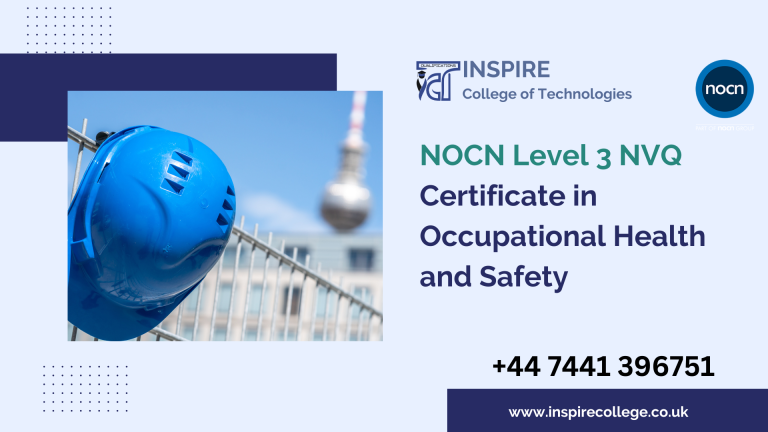
ProQual Level 5 NVQ Diploma in Management and Leadership
One of the significant advantages of the ProQual Level 5 NVQ Diploma is its practical approach to learning. The course is designed to be applied directly to real-world scenarios, ensuring that learners can immediately implement their new skills in their current roles. This hands-on learning approach not only enhances the relevance of the training but also ensures that participants can demonstrate their capabilities in practical settings.
The curriculum of the ProQual Level 5 NVQ Diploma covers a broad spectrum of management and leadership topics. It includes modules on leading and managing a team, implementing operational plans, and managing change within an organization. These modules are tailored to address the specific needs of professionals in various sectors, making the qualification versatile and applicable across different industries.
Achieving the ProQual Level 5 NVQ Diploma can significantly impact your career prospects. It is a valuable credential that highlights your commitment to professional development and your ability to manage complex organizational challenges effectively. This diploma can open doors to higher-level management positions, provide a competitive edge in the job market, and increase your earning potential.
For those considering pursuing this qualification, it is essential to choose a reputable training provider. Look for institutions that offer accredited programs with experienced instructors who can provide personalized support throughout your learning journey. Additionally, ensure that the provider offers a flexible learning approach that fits with your professional and personal commitments.
The ProQual Level 5 NVQ Diploma in Management and Leadership is a significant investment in your professional growth. It offers a comprehensive and practical approach to developing essential management skills and prepares you for advanced leadership roles. By achieving this diploma, you demonstrate your dedication to excellence in management and position yourself for success in today’s competitive business environment.
For information regarding fees or any queries related to the course, please feel free to contact us or send an email. Our dedicated team is available to assist you with any questions and provide further guidance as needed.
Inspire College Uk is an approved centre of ProQual for following ProQual Qualifications
To enrol in the ProQual Level 4 NVQ Diploma in Management, candidates must meet certain entry requirements to ensure they have the necessary background and qualifications for the course. Typically, applicants should possess one of the following:
- There are no formal entry requirements for this qualification.
- Centres should carry out an initial assessment of candidate skills and knowledge to identify any gaps and help plan the assessment.
Mandatory Units
The ProQual Level 5 NVQ Diploma in Management and Leadership candidates must achieve a minimum of 53 credits:
- 22 credits from Mandatory Group A, plus
- A minimum of 23 credits from Optional Group B
- A maximum of 8 credits can come from Optional Group C
Mandatory Units
Group A:
Group B:
Group C:
ProQual Level 5 NVQ Diploma in Management and Leadership
Contribute to the development of a strategic plan
- Understand the principles of strategic planning
- Be able to analyse the factors affecting the development of strategic plans
- Be able to make a contribution to a strategic plan
Design business processes
- Understand techniques and tools that support the design of business processes
- Be able to develop business processes
- Be able to evaluate the effectiveness of business processes
Manage strategic change
- Understand the management and evaluation of change
- Be able to plan for strategic change
- Be able to manage strategic change
- Be able to evaluate strategic change
Provide leadership and management
- Understand the principles supporting leadership and management
- Be able to engage and inspire stakeholders and colleagues
- Be able to deliver results
Establish business risk management processes
- Understand business risk management models and techniques
- Be able to develop business risk management processes
- Be able to evaluate the effectiveness of business risk management processes
Promote equality of opportunity, diversity and inclusion
- Understand the principles underpinning equality, diversity and inclusion in the workforce
- Be able to evaluate organisational strategies, policies and practices which address equality, diversity and inclusion requirements
- Be able to promote equality, diversity and inclusion policies and practices
Develop and manage collaborative relationships with other organisations
- Understand the principles of effective collaboration with other organisations
- Be able to identify external collaborative relationships to be developed
- Be able to collaborate with other organisations
Optimise the use of technology
- Understand the principles underpinning the optimisation of technology
- Be able to scope the use of technology
- Be able to optimise the use of technological solutions
- Be able to manage the use of technology
Manage product and/or service development
- Understand the development of new or improved products and/or services
- Be able to establish the need for new or improved products and/or services
- Be able to manage the development of new or improved products and/or services
Develop and maintain professional networks
- Understand the principles of effective networking
- Be able to identify professional networks for development
- Be able to maintain professional networks
Develop and implement an operational plan
- Understand the principles of operational planning
- Be able to develop an operational plan
- Be able to implement an operational plan
- Be able to evaluate the effectiveness of an operational plan
Encourage learning and development
- Understand the principles of learning and development
- Be able to support individuals’ learning and development
- Be able to evaluate individuals’ learning and development
Discipline and grievance management
- Understand the principles supporting the management of discipline and grievance cases
- Be able to manage a disciplinary case
- Be able to manage a grievance
Develop working relationships with stakeholders
- Understand working relationships with stakeholders
- Be able to determine the scope for collaboration with stakeholders
- Be able to develop productive working relationships with stakeholders
- Be able to evaluate relationships with stakeholders
Manage a tendering process
- Be able to develop a tender specification
- Be able to manage a tendering exercise
- Be able to negotiate the award of contracts
Manage physical resources
- Be able to identify the need for physical resources
- Be able to obtain physical resources
- Be able to manage the use of physical resources
Manage the impact of work activities on the environment
- Understand how to support environmentally-friendly working practices
- Be able to organise work so as to minimise the impact on the environment
- Be able to manage the environmental impact of the use of resources
Prepare for and support quality audits
- Understand the principles underpinning the management of quality
- Be able to prepare for quality audits
- Be able to support quality audits
Conduct quality audits
- Understand the principles underpinning the management of quality
- Be able to prepare to carry out quality audits
- Be able to conduct quality audits
Manage a budget
- Understand how to identify financial requirements
- Understand how to set budgets
- Be able to manage a budget
- Be able to evaluate the use of a budget
Manage a project
- Understand the management of a project
- Be able to plan a project
- Be able to manage a project
- Be able to evaluate the effectiveness of a project
Manage business risk
- Understand the management of business risk
- Be able to address business risk
- Be able to mitigate business risk
Manage knowledge in an organization
- Understand the principles of knowledge management
- Be able to identify knowledge to be managed within an organization
- Be able to manage knowledge within an organization
Recruitment, selection and induction practice
- Understand the principles and theories underpinning recruitment, selection and induction practice
- Be able to recruit people into an organization
- Be able to select appropriate people for the role
- Be able to induct people into an organization
Manage redundancy and redeployment
- Understand the management of redundancy
- Understand the principles of redeployment
- Be able to manage a redundancy
- Be able to manage the redeployment of staff
Lead the development of a knowledge management strategy
- Understand the principles underpinning knowledge management
- Be able to develop a knowledge management strategy
- Be able to manage knowledge
- Be able to promote knowledge management
Lead the development of a quality strategy
- Understand the principles underpinning the development of a quality strategy
- Be able to develop a quality strategy
- Be able to manage quality
Lead the development of a continuous improvement strategy
- Understand the principles underpinning the development of a continuous improvement strategy
- Be able to develop a continuous improvement strategy
- Be able to manage continuous improvement
Manage strategic marketing activities
- Understand the strategic management of marketing activities
- Be able to evaluate a market
- Be able to develop a marketing communications strategy and plan
- Be able to manage strategic marketing activities
Manage Health and Safety in own area of responsibility
- Understand responsibilities and liabilities in relation to health and safety legislation
- Understand how to assess, monitor and minimise health and safety risks in own area of responsibility
- Be able to review health and safety policy in own area of responsibility
- Be able to communicate health and safety policy in own area of responsibility
- Be able to monitor health and safety in own area of responsibility
Contribute to the design and development of an information system
- Understand information system design requirements
- Be able to contribute to the specification of an information system
- Be able to recommend options for the development of an information system
Manage information systems
- Understand the management of information systems
- Be able to set up information system processes
- Be able to manage an information system
Manage events
- Understand the management of an event
- Be able to manage the planning of an event
- Be able to manage an event
- Be able to follow up an event
Manage customer service operations
- Understand the management of customer service operations
- Be able to plan customer service operations
- Be able to manage customer service operations
- Be able to prepare staff for the delivery of customer service
- Be able to measure customer service performance
Review the quality of customer service
- Understand how to review the quality of customer service
- Be able to plan the measurement of customer service
- Be able to evaluate the quality of customer service
Developing sales proposals
- Understand how to write sales proposals
- Be able to develop sales proposals
- Be able to evaluate the proposal
Prioritising information for sales planning
- Understand sources and types of information that support sales
- Understand internal information that supports sales
- Be able to carry out a business audit of the internal and external sales environment
- Be able to use sales information to support the sales planning function
The ProQual Level 5 NVQ Diploma in Management and Leadership is designed for individuals who are currently in, or aspiring to, senior management and leadership roles. It is particularly suitable for those seeking to enhance their strategic management skills and gain formal recognition of their leadership capabilities. This qualification is ideal for professionals who are responsible for developing and implementing business strategies, leading teams, and driving organisational success.
This course is suitable for:
- Senior Managers and Leaders – Professionals who are responsible for setting strategic goals, leading organisational change, and managing multiple teams or departments.
- Department Heads and Operational Managers – Individuals overseeing specific departments or business units who wish to refine their leadership and operational management skills.
- Project Managers – Those who lead complex projects and need to develop skills in strategic planning, resource management, and leadership.
- Aspiring Senior Leaders – Professionals aiming for higher-level roles within their organisation and seeking to build strategic leadership competencies.
- Business Owners and Entrepreneurs – Individuals running their own businesses who want to strengthen their leadership, decision-making, and management skills for business growth.
- HR and Training Managers – Professionals responsible for staff development and organisational growth who require advanced leadership knowledge to enhance employee performance and engagement.
This qualification is ideal for individuals across various sectors, including business, healthcare, education, construction, and public services, who are committed to advancing their leadership careers and driving organisational success.
Register Now
FAQs for ProQual Level 5 NVQ Diploma in Management and Leadership






